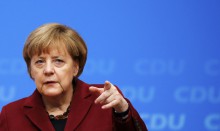Late on November 19, leader of the Free Democratic Party (FDP) Christian Lindner announced that his political force was quitting the talks on forming a new ruling coalition that lasted for almost a month. It had been expected that the so-called Jamaica coalition would include the Christian Democratic Union (CDU) and the Christian Social Union (CSU), as well as the Green Party and the FDP.
The party’s leadership explained on Twitter that the political force “is unable to assume responsibility for the spirit of the documents of the coalition talks,” that they had been forced to “abandon their basic principles,” so they decided not to fail their voters by supporting the political course they do not believe in, reports the DW. “It is better not to govern than to govern wrongly,” said Lindner.
Meanwhile, German Chancellor and head of the CDU party Angela Merkel expressed regret that the negotiators “could not come to a mutual agreement,” and in particular on the issue of migration. The head of the CSU party Horst Seehofer said that the agreement “had been in reach,” and the head of the Green Party Cem Ozdemir said that the coalition had been possible “in the presence of goodwill.”
Politico believes that a new election in the country is highly likely. The BBC reports that the collapse of the negotiations left “Angela Merkel facing her biggest challenge in 12 years as chancellor.” “Ms. Merkel must now fight for political survival. The leader who for so many people has represented stability now is fast becoming a symbol of crisis in the heart of Europe,” writes BBC News’ correspondent in Berlin Jenny Hill.
“UKRAINE’S FORMULA THAT ‘GERMANY IS MERKEL’ IS LOSING QUITE A BIT OF ITS RELEVANCE”
Aliona HETMANCHUK, director of the New Europe Center:
“The collapse of the coalition talks means that the risk of a new election for the Bundestag is very high. There is still an option to create a minority government, but Merkel has strongly opposed the creation of such a government. It remains to be hoped that under the influence of the factor of a new election, her stance will be somewhat modified in this regard.
“The grand coalition with the Social Democrats is a highly uncertain prospect as well: they are unanimously reaffirming their unwillingness to join the coalition, and some representatives of the Social Democratic Party have already declared their readiness to run in a new election.
“There is nothing good for Ukraine in these developments in Germany. Another election is unlikely to end with an outcome which would be any better for our partnership with Germany.
“In general, any still available scenario means a period of uncertainty and probably weakening of Chancellor Merkel’s position. Even during the coalition talks, Merkel had to act as a moderator instead of defending the position of her political force. In addition, Merkel’s position in her own party is unstable. There is even concern that Merkel may fail to get re-elected as the head of the party. This once again emphasizes the need for Ukraine to intensify communication with various political actors in Germany. Ukraine’s formula that ‘Germany is Merkel’ is losing quite a bit of its relevance.”








